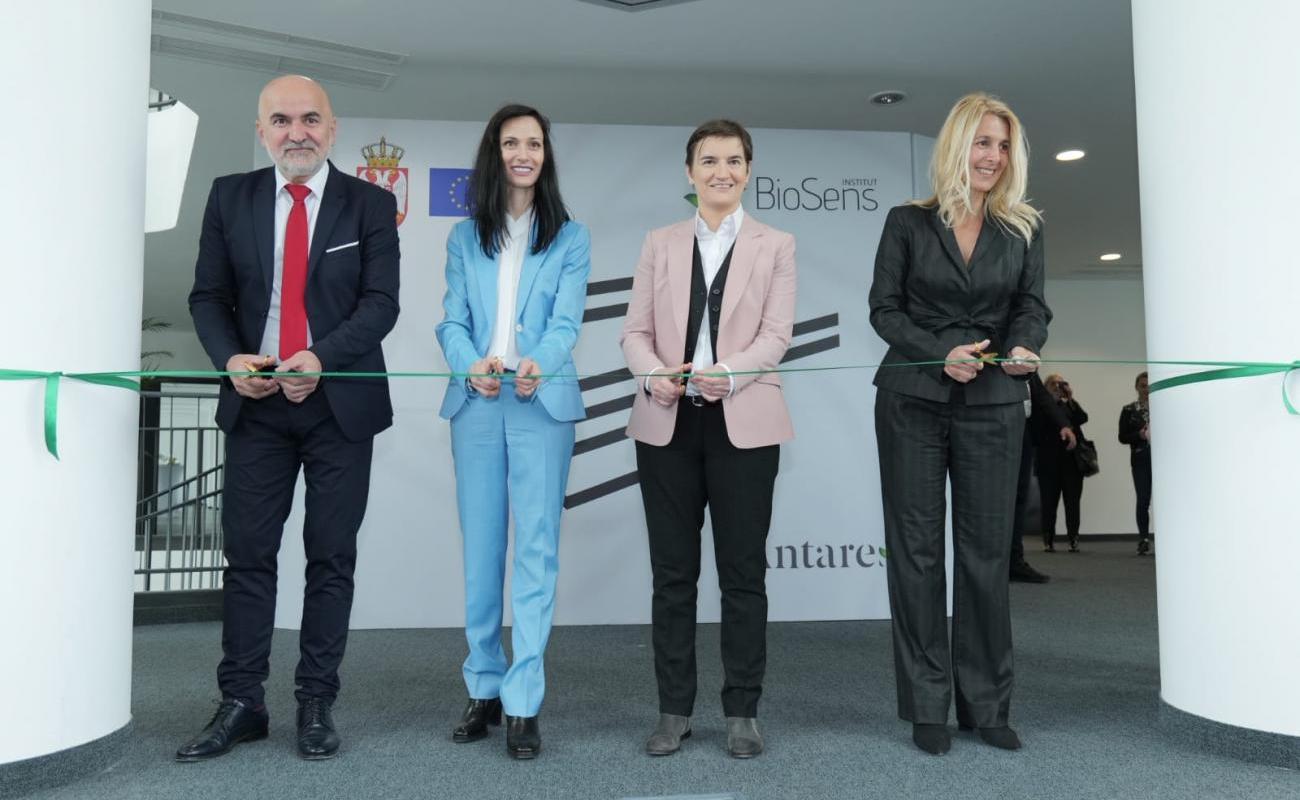BioSens Institute opens a new building for scientists and start-ups

The new building of BioSens Institute in Novi Sad was officially opened by the European Commissioner for Innovation, Research, Culture, Education and Youth Mariya Gabriel, together with the Prime Minister of the Republic of Serbia Ana Brnabić, as well as the Director of BioSense Institute Vladimir Crnojević and the ANTARES Project Manager Vesna Bengin.
Owing it to the EU co-financing, new capacities and highly sophisticated equipment will enable the Institute’s scientific potential to be strengthened and transformed into a European centre of excellence, capable of implementing the most advanced globally applicable projects.
“BioSens shows that the fields of agriculture and biotechnology are essential for our everyday life. With the new way of innovation, we can better connect science with innovation and education, all through the Centre for Excellence, Leadership and Talent”, Commissioner Gabriel said at the opening ceremony.
With specific anti-vibration module, this is the first building of its kind ever built in Serbia, which enables the application of highly sensitive equipment for the development of sensors, micro and nano technologies. BioSens is the only European Centre of Excellence outside the EU, the Prime Minister Brnabić pointed out.
“Digital agriculture is a synergy between technology and agriculture, necessary in the time of climate challenges in order to ensure that agriculture is sustainable, that it provides better results and that we as a country, with the help of science and scientific institutes, give adequate support to our farmers and enable their competitiveness in the future”, said Brnabić.
The EU is financing the BioSens Institute through the ANTARES Project with a grant of EUR 14 million from the Horizon 2020 EU program “Spreading Excellence and Widening Participation”. The contribution of the Government of Serbia included additional EUR 20 million, which were partly provided through a favourable loan of EUR 18 million from the European Investment Bank. This amount is dedicated to the development of research infrastructure such as the Institute’s new building and state-of-the-art scientific equipment.
ANTARES has enabled the BioSens Institute to grow from only 50 employees at the beginning of the project to over 140 employees at the moment, more than 50 of whom have a PhD degree. So far, the project has directly funded 37 new jobs, with 15 more positions expected by the end of the project. It significantly strengthened the scientific capacity of the Institute, which resulted in 36 new Horizon projects, 22 other international projects, 9 industrial and 38 national projects, with a total income of about EUR 20.5 million.
“Today, Serbia is recognized as a scientific destination, top researchers from all over the world apply for the competitions we announce. Students in Serbia now choose majors in order to get a job at BioSens Institute and to build their scientific careers in their country. These are huge results”, said Vesna Bengin, from the ANTARES project.
The Institute attracts top talent from around the world due to these advanced facilities, including, among others, a state-of-the-art clean room. They will have a unique opportunity to design sustainable and digitized solutions for agriculture, essential for solving climate challenges, resource and food shortages.
During her visit to Novi Sad, Commissioner Gabriel, together with the Minister of Education, Branko Ružić and the UNICEF Director in Serbia, Deyana Kostadinova, visited the School for Primary and Secondary Education “Milan Petrović” which includes students’ dorm. On this occasion, she handed the school equipment for the integration of assistive learning technologies worth EUR 20,000, which will improve the inclusiveness of education in Serbia.
The Commissioner also met with inspiring representatives of young people from Serbia and heard the experiences of Novi Sad as the European Youth Capital 2019, in the OPENS Youth Centre, and visited the Gallery of Matica Srpska Gallery together with the Deputy Prime Minister and the Minister of Culture, Maja Gojković in order to learn about the achievements of Novi Sad – the European Capital of Culture 2022 and observe the heritage of Serbian art in a broader European context.
